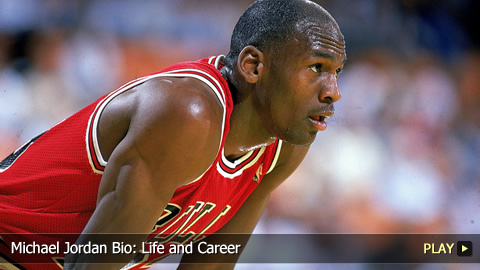Michael Jordan Bio: Life and Career

Early Years
Michael Jeffrey Jordan was born February 17th, 1963 in Brooklyn, New York, and was raised in Wilmington, North Carolina. While his first love was baseball, Jordan focused more on basketball as he got older. Ironically, he was cut from his high school varsity team because – at 5’11” – he wasn’t tall enough. That made him persevere, and he eventually posted an average of 20-points-per game by the end of school.
College and the NCAA
In 1981, a fully-grown, 6’6” Michael Jordan won a basketball scholarship to the University of North Carolina at Chapel Hill. While studying cultural geography, he became a leader on the school’s team, and sank the game-winning basket to take the 1982 NCAA Championship against Patrick Ewing and his Georgetown Hoyas.
1984 Olympics
Jordan’s rise to the top continued: after being named NCAA College Player of the Year two seasons in a row, he won a gold medal for the United States at 1984’s Los Angeles Summer Olympics. He then left school early to enter the NBA Draft, where he was chosen third overall by the Chicago Bulls.
Rookie of the Year
Jordan quickly made his mark: his fan popularity soared league-wide, and he averaged over 28 points-per-game. Not surprisingly, he took home the Rookie of the Year title.
More Success
Jordan’s second season in the NBA was shortened due to a broken foot. But, he was ready for ‘86-‘87: his per-game average was over 37 points that year, and he was the first player since Wilt Chamberlain to bank over three thousand points in a single season. However, the Bulls were swept out of the playoffs by the Boston Celtics.
League MVP
Jordan was named league MVP for 1987-88, and won that title four more times throughout his career. His success forced teams to develop “Jordan rules” to throttle his efforts on the court.
The Shot
But, despite his mega-talent, Jordan remained without a championship for the first years of his career. Regardless, he was known as an offensive powerhouse and a clutch player. This was proven by a buzzer-beater move called “The Shot” that occurred during a 1989 playoff game against the Cleveland Cavaliers.
First Three-Peat
By the 1990s, the Bulls were unstoppable. They took home the first NBA championship in franchise history in 1991, and this proved emotional for Jordan. That was the first year of the Bulls’ first three-peat.
The Dream Team
During that era, Jordan joined the Dream Team at 1992’s Barcelona Olympics to win another gold medal for his country. His many lucrative endorsement deals with companies like Nike ensured his face was everywhere. By the end of ’92-’93, Jordan scored his 20 thousandth point.
First Retirement
However, his gambling habits soon caused controversy. Things got far worse when, on July 23rd, 1993, Jordan’s father was killed during a robbery. These personal issues caused MJ to surprise the world by announcing his retirement on October 6th, 1993.
Baseball
The next year, Jordan followed his father’s wishes and began a baseball career. He was moderately successful, and on November 1st, the Bulls retired Jordan’s number 23. But, that proved premature.
Back in the NBA
On March 18th, 1995, Jordan issued a press release that read: “I’m back.” The next day, he donned number 45 for the Bulls. He eventually took back his old number, and the next season the Bulls began their second three-peat that decade.
The Flu Game
One of Jordan’s most memorable moments from the ’97 Finals was his “Flu Game,” where he played while visibly ill. Didn’t matter: he scored 38 points.
Second Retirement, Return, and Final NBA Game
The next season began with a lockout. This was one of many reasons Michael Jordan announced his second retirement on January 13th, 1999. But, just a year later, he returned as the Washington Wizards’ part-owner, and by 2001 he was with them on the court. In two seasons, he posted more records and finally played his last NBA game on April 16th, 2003.
Career After Basketball
Following his playing career, Jordan stayed involved in basketball, and eventually became primary owner of the Charlotte Bobcats.
Legacy
Michael Jordan was inducted into the Naismith Memorial Basketball Hall of Fame in 2009. With countless records, numerous successful endorsement deals and an unmatched legacy, he remains one of the most recognizable athletes on the planet.